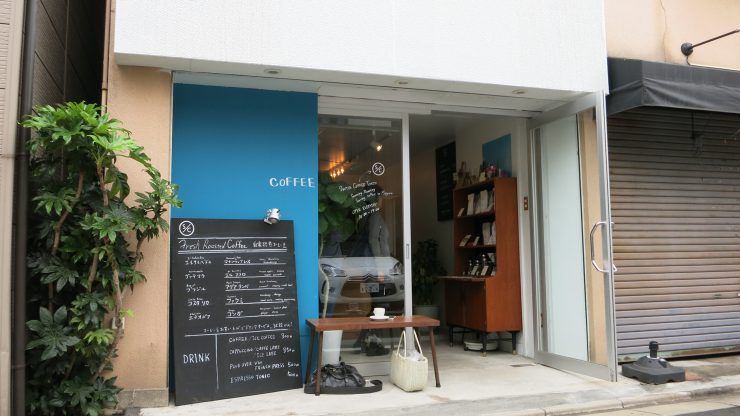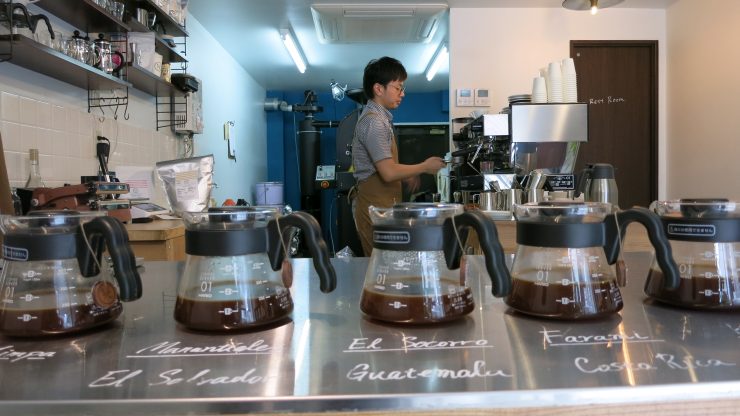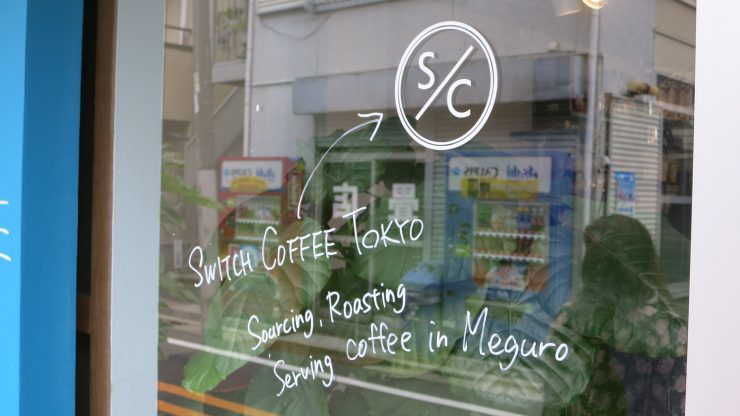“Coffee isn’t necessarily anything special. Sometimes it’s just a part of daily life.”
8:00 a.m. and Meguro Station is a lazy, subdued quiet. Even Tokyo, it seems, sleeps in a little over the weekend. If you walk down the gentle slope towards Meguro river and cut right towards Switch Coffee, you’ll likely meet a few early risers—couples in matching jackets out jogging, dog walkers big and small, and perhaps a salaryman or two stumbling home, hungover.
Under a half-closed metal shutter that marks the shop as closed, past a stainless steel counter and espresso machine, Masahiro Onishi is already starting on the day’s roasting. In a few hours, as the sun rises and the day warms, and the cogs that turn Tokyo start to grind, those joggers, walkers, salarymen, and locals of Meguro will need their specialty coffee fix, and Switch Coffee is the place here to get it.
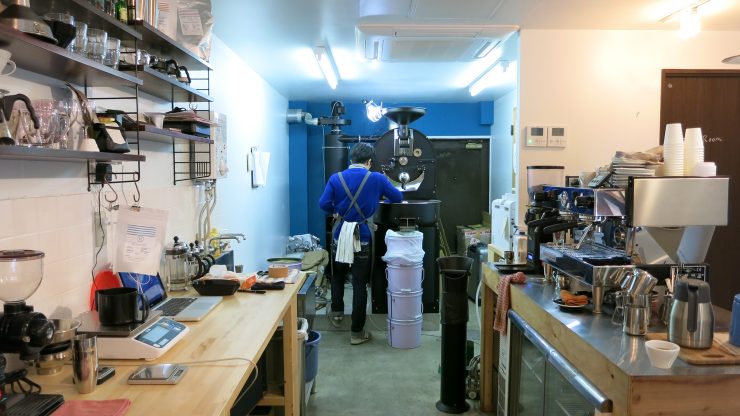
The beans of the first batch spin around in the Probat roaster, its cold blacks and greys highlighted by sky blue paint on the wall behind. Onishi’s gaze wanders from a tiny glass window of spinning beans to a computer readout, and he listens. When he hears the first crack, he makes a few quick scribbles on a hanging clipboard—the ongoing record of previous roasts.
“Coffee depends heavily on the roaster,” he muses. “But every link in the specialty coffee process is equally important. Roasting is about understanding the process, where the beans are from, and revealing their flavor and character. But then, coffee is also a very individual thing, and not necessarily anything special. Sometimes it’s just a part of everyday life,” says Onishi.
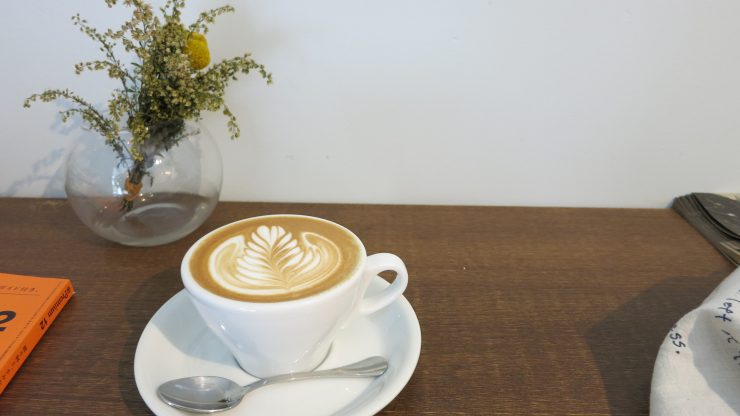
“I’m a baby when it comes to roasting age.”
As he keeps an eye on the roaster, Onishi tells me of his six years as a barista around Japan. “Like maybe all baristas,” he says, “I used to be obesessed with latte art.” This obsession earned him second place at the Millrock Latte Art Championship in 2010, and upon returning to Tokyo he met Toshiyuki Ishiwata, who now heads the roasting for Market Lane Coffee. It was Ishiwata, Masa’s first real teacher, who encouraged him to deepen his knowledge of roasting in Melbourne.
After a year in Melbourne learning the ropes of roasting, Masa returned to Japan and moved to Fukuoka, falling under the tutelage of Katsuhide Izaki, a certified Cup of Excellence judge, and the owner of Honey Coffee in Fukuoka. “Izaki was a great second teacher. He taught me everything about specialty coffee itself – especially sourcing and green quality.”
Eventually Onishi moved to Tokyo, opening Switch Coffee in October of 2013.
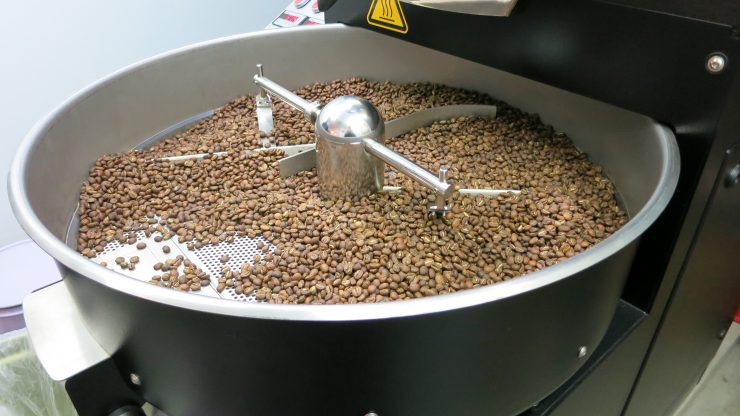
A newly roasted batch of coffee crashes down on the cooling bed, and Onishi turns the scoop gently with his hand, taking stock of the new batch. “Coffee culture in Melbourne is very impressive. Lots of experimentation, lots of emphasis on the seed to cup process. I wanted to bring that home.”
He sifts through the warm coffee beans. “I’m still a baby when it comes to roasting age. I’m experimenting a lot, still learning,” he says, picking out imperfections and placing them in a separate container. “Sometimes I fail,” he admits sheepishly.
“Almost all of us specialty coffee guys, we love Kenyan coffee”
A selection of the day’s four roasts are laid out on the edge of the counter in numbered bowls, and a further, smaller selection is ground and readied in four glasses. Onishi breathes deep of the aroma in each cup, and then again once he’s added water. “I like to leave the beans a day before cupping, but we don’t have that luxury today.” He goes back to one cup and sniffs again, his nose searching out sensations he’ll later explain to customers.
He tastes each of them in turn, pausing at points perhaps to reflect on how they went. One of them brings a smile to his face. It’s Kenyan, from Gotomboya. “Almost all of us specialty coffee guys, we love Kenyan coffee,” he says. “There’s a fruitiness to it, like cherries and oranges. A good complexity of taste, and good acidity. It’s rarely sour.” He looks down at the cups, shrugging. “Also, it just tastes good.”
After cupping, Onishi moves to the back counter and opens up a Macbook Air, searches through a playlist and decides on a morning soundtrack. He opens the half-closed shutter, and places a signboard out the front with a bench just big enough for two. The smell of coffee and the sounds of the Rolling Stones waft out into the fresh end-of-winter air.
“My priority is simply providing good, quality coffee”
Light streams in through the front glass doors, and locals begin to drop in—first a young couple on a walk with their pug dogs, then a fashion magazine reporter, complete with potato-shaped jacket. After a brief lull, a middle-aged woman looking for a latte refill comes in, then a local elderly man, perhaps more interested in the chat than the beans he walks out with. At Switch Coffee on a Saturday morning, conversation flows lazily from the weather to the beans to the music to the coffee—but everyone seems to leave with a little more knowledge of coffee than when they came in.
Onishi works calmly and efficiently. At this time of morning, there’s simply never a rush. But as he taps the steel milk jug against the counter, and pours the milk that makes the lattes, there’s focus stenciled into his features. He may see his latte-art days as being behind him now, but it’s a symbol of care for each step of the process, and one he seems to still take seriously.
“Actually, I just want coffee to be a part of daily life for people here, and I want the local coffee shop to just be another store in the neighborhood, like the local fruit shop or supermarket,” he tells me. “I’m always really happy when people come from afar to visit, but my priority is simply providing good, quality coffee to the people in this neighborhood.”
Switch Coffee is located at Meguro-ku, Tokyo Meguro 1 -17 – 23.
Hengtee Lim (@Hent03) heads up Sprudge’s Tokyo desk. Read more Hengtee Lim on Sprudge.


